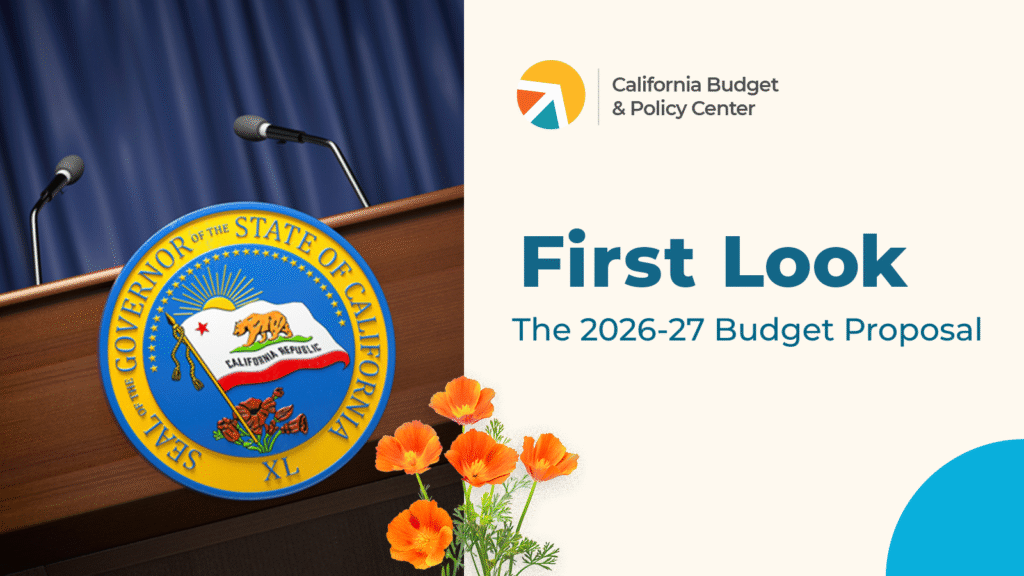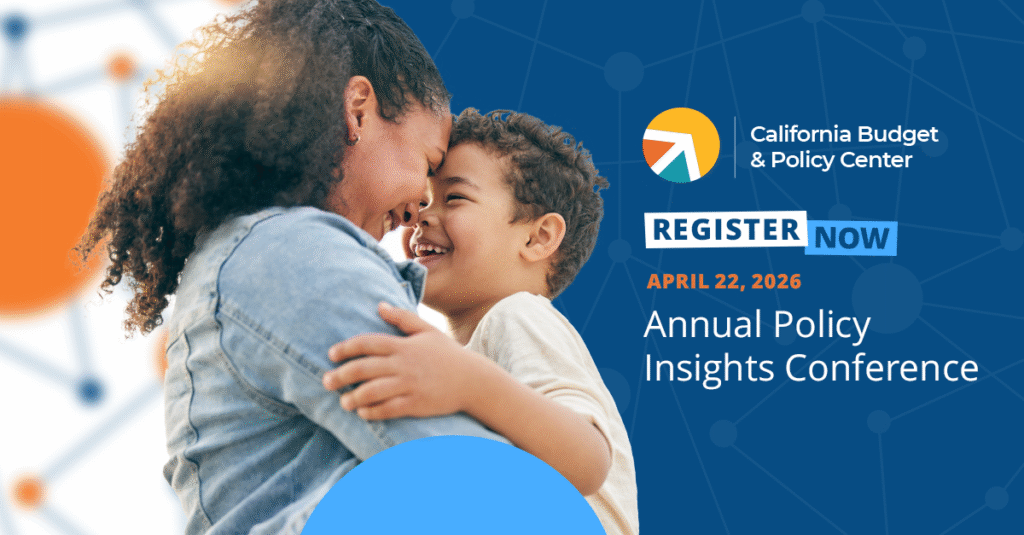Displaying 1-12 of 582 results found
-
Report
First Look: Understanding the Governor’s Proposed 2026-27 California Budget
related content Introduction Governor Gavin Newsom released his proposed 2026-27 California state budget on January 9, projecting a small and manageable deficit of $2.9 billion. The governor’s proposal projects $42.3 billion in additional revenue across the “budget window” (fiscal years 2024-25 to 2026-27) compared to projections made last June in the enacted budget. The $248.3 … Continued California Budget
California Budget -
Report
H.R. 1 and the Federal Budget: How California Leaders Can Respond to Trump’s Cuts
key takeaway H.R. 1, the harmful Republican megabill passed in July 2025, will deeply harm Californians by cutting funding for essential programs like health care, food assistance, and education — while providing massive tax breaks to the wealthy and corporations. The spending cuts will disproportionately impact families with low incomes, immigrants, and communities of color, … ContinuedCalifornia BudgetFederal Policy -
5Facts
Understanding California’s 1.8 Million Gap in Publicly Funded Child Care
key takeaway California’s failure to expand publicly funded child care leaves 1.8 million eligible children without access, worsening affordability, racial inequities, and affordability challenges for families statewide. California’s state leaders acknowledge that child care is a key driver of unaffordability and is critical for children’s healthy development and a strong state economy. Among these state … ContinuedChild Care & Preschool -
Fact Sheet
Timeline of Funding Cuts to Medi-Cal and CalFresh in California
key takeaway Many provisions in the harmful Republican megabill, H.R. 1, and the 2025-26 California state budget will directly reduce federal and state funding for Medi‑Cal and CalFresh, putting millions of Californians at risk of losing health care coverage and food assistance. The recently enacted Republican megabill, H.R. 1, includes the largest funding cuts to health … ContinuedCalFreshFederal PolicyHealthMedi-CalSafety Net -
More with Less: California’s Homelessness Spending Declines
key takeaway California’s homelessness investments continue to decline despite evidence that they are working, and proposed HHAP funding reductions combined with federal threats endanger continued progress. California has both the resources and the responsibility to ensure every resident has a stable, dignified place to call home. In 2024, homeless service providers served over 350,000 Californians … ContinuedHousing & Homelessness -
Presentation
Dollars & Democracy: An Introduction to California’s State Budget Process
Dollars & Democracy: An Introduction to California’s State Budget Process is an introductory training slide deck that breaks down how California’s state budget works. Designed to be clear, engaging, and accessible, this slide deck explains the fundamentals of the state budget, the rules that shape the process, the key decision-makers involved, and the advocacy opportunities … ContinuedBudget Academy -
Issue Brief
Supporting Survivors: The Need for Stable Funding for Victim Services
key takeaway Federal funding instability to the Victims of Crime Act (VOCA) threatens essential services for survivors of domestic violence, creating uncertainty for service providers who rely on these funds. To ensure survivors receive the support they need, state and federal policymakers must prioritize stable, ongoing funding and prevent further cuts to VOCA.” Every Californian … ContinuedPoverty & Inequality -
Fact Sheet
H.R. 1’s SNAP Rules Will Harm Californians Experiencing Homelessness
key takeaway For most Californians experiencing homelessness, CalFresh (SNAP) is among the few safety net programs that consistently provide basic access to food. Under the Republican megabill H.R. 1, arbitrary time limits and work requirements threaten food assistance for unhoused adults ages 18–64 without a disabling condition or dependents. Many Californians experiencing homelessness rely on … ContinuedCalFreshFederal PolicyHousing & Homelessness -
Report
Guía: Proceso de presupuesto estatal de California
Este informe ofrece información sobre el presupuesto estatal y su proceso, con el objetivo de brindar al público las herramientas necesarias para interactuar eficazmente con líderes estatales y abogar por decisiones presupuestarias justas y equitativas.Budget AcademyCalifornia Budget -
Issue Brief
How Policy Changes Are Affecting Women’s Economic Security in California
key takeaway Women in California continue to experience higher poverty rates than men, highlighting that despite decades of progress in job opportunities and earnings, women — especially women of color — still face persistent barriers. While recent state and federal budget cuts threaten to worsen these inequities, state policymakers have the tools to ensure all … ContinuedPoverty & Inequality -
Fact Sheet
State Budget Process and Legislative Process: Key Activities and Deadlines
The most common way for Californians to shape state funding decisions and policy priorities is through the state budget process and the legislative (or policy bill) process. The deadlines for the state budget process are established in California’s Constitution or in state law and rarely change. In contrast, most of the deadlines for the legislative … ContinuedBudget AcademyCalifornia Budget -
Glossary
Tax and Revenue Policy Glossary
What’s the difference between income and wealth? Taxes for individuals and corporations in California? Tax credits and deductions? Understanding these key terms is critical to navigating the state budget and its intersection with California’s tax and revenue system to generate ongoing resources and provide quality education, affordable health care, child care, housing, and other services … ContinuedBudget AcademyTaxes & Revenue
Page of 49

Want to Better Understand
the State Budget?
The Budget Center’s essential resources for understanding and navigating the California state budget — all in one place.

